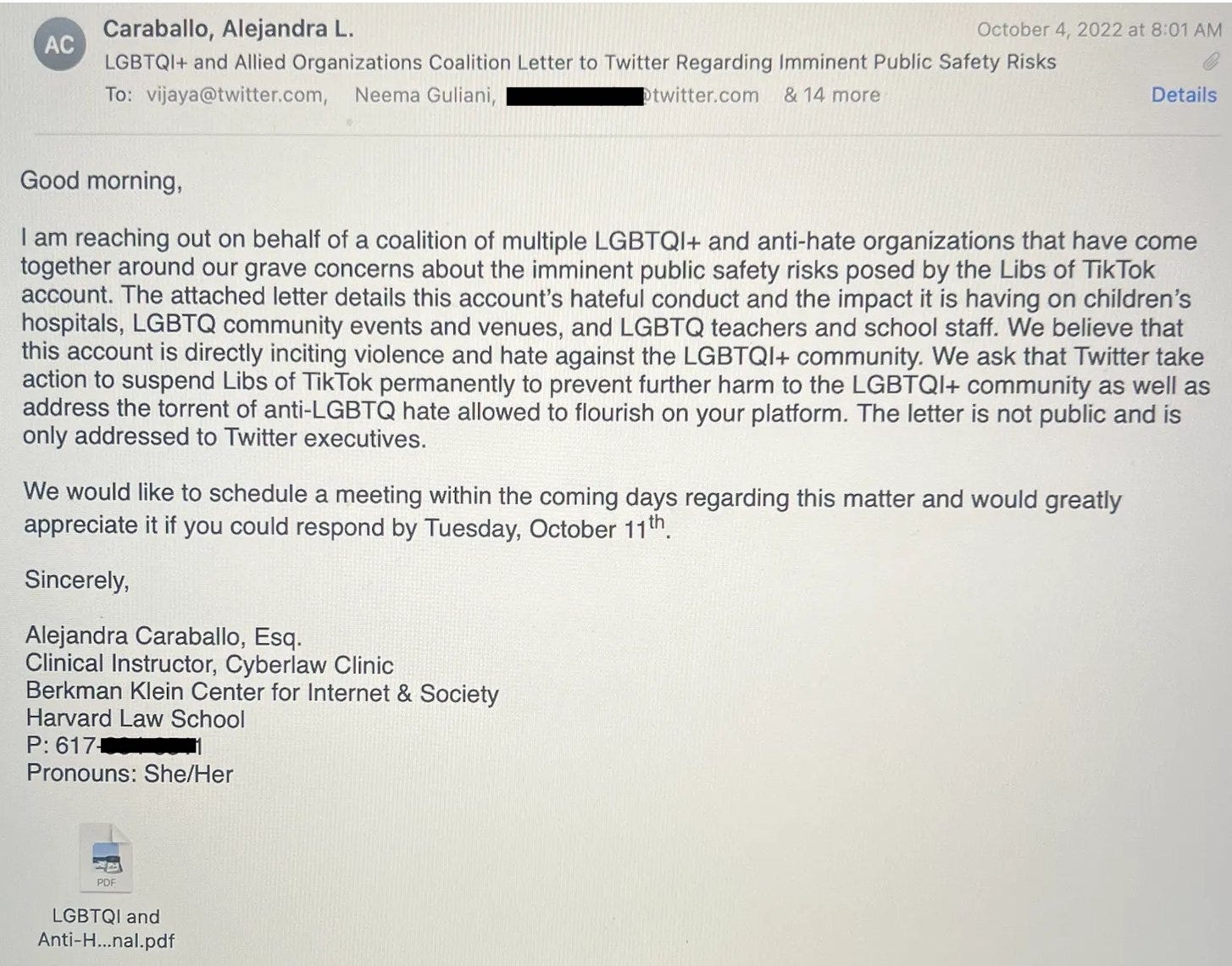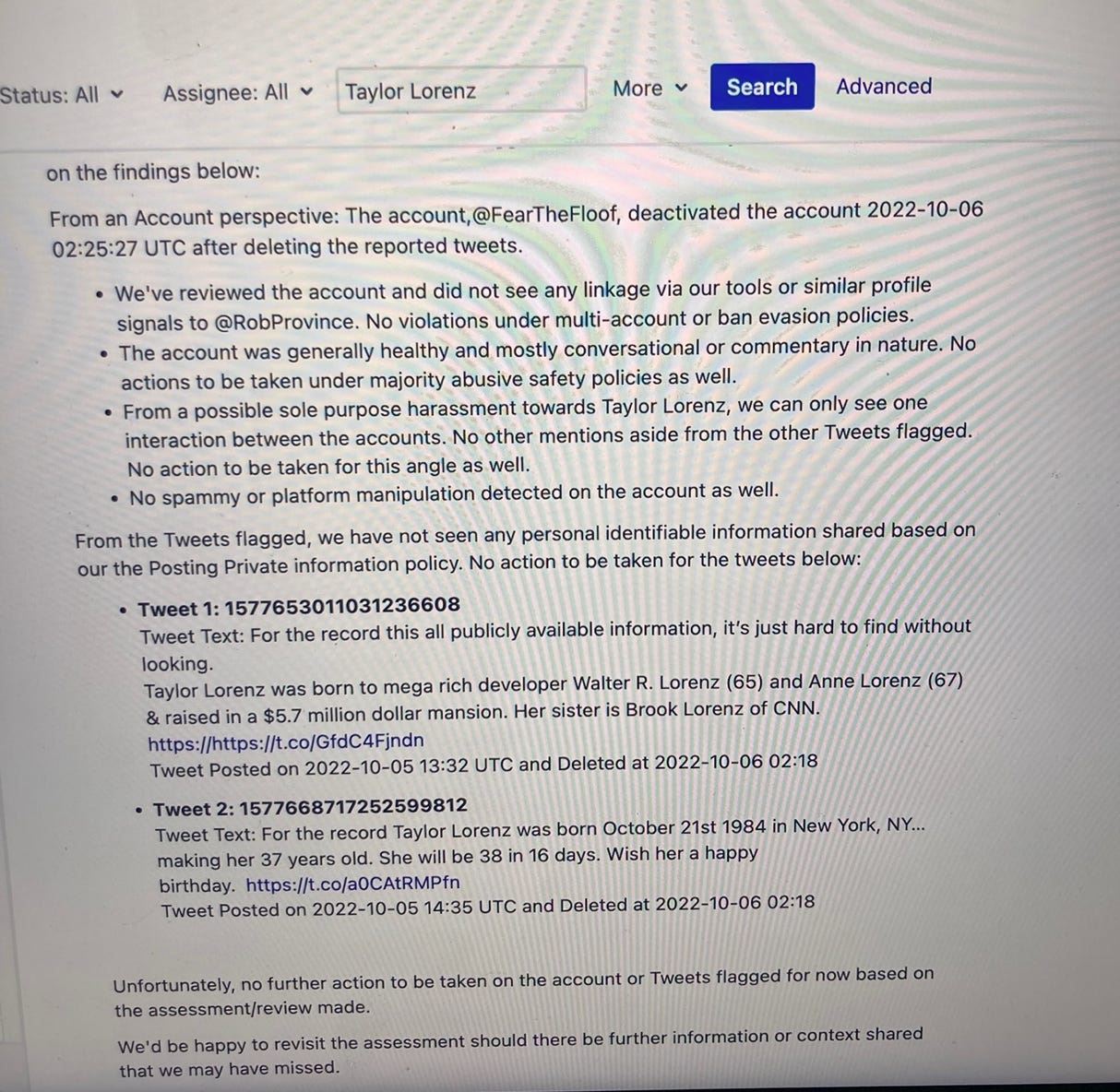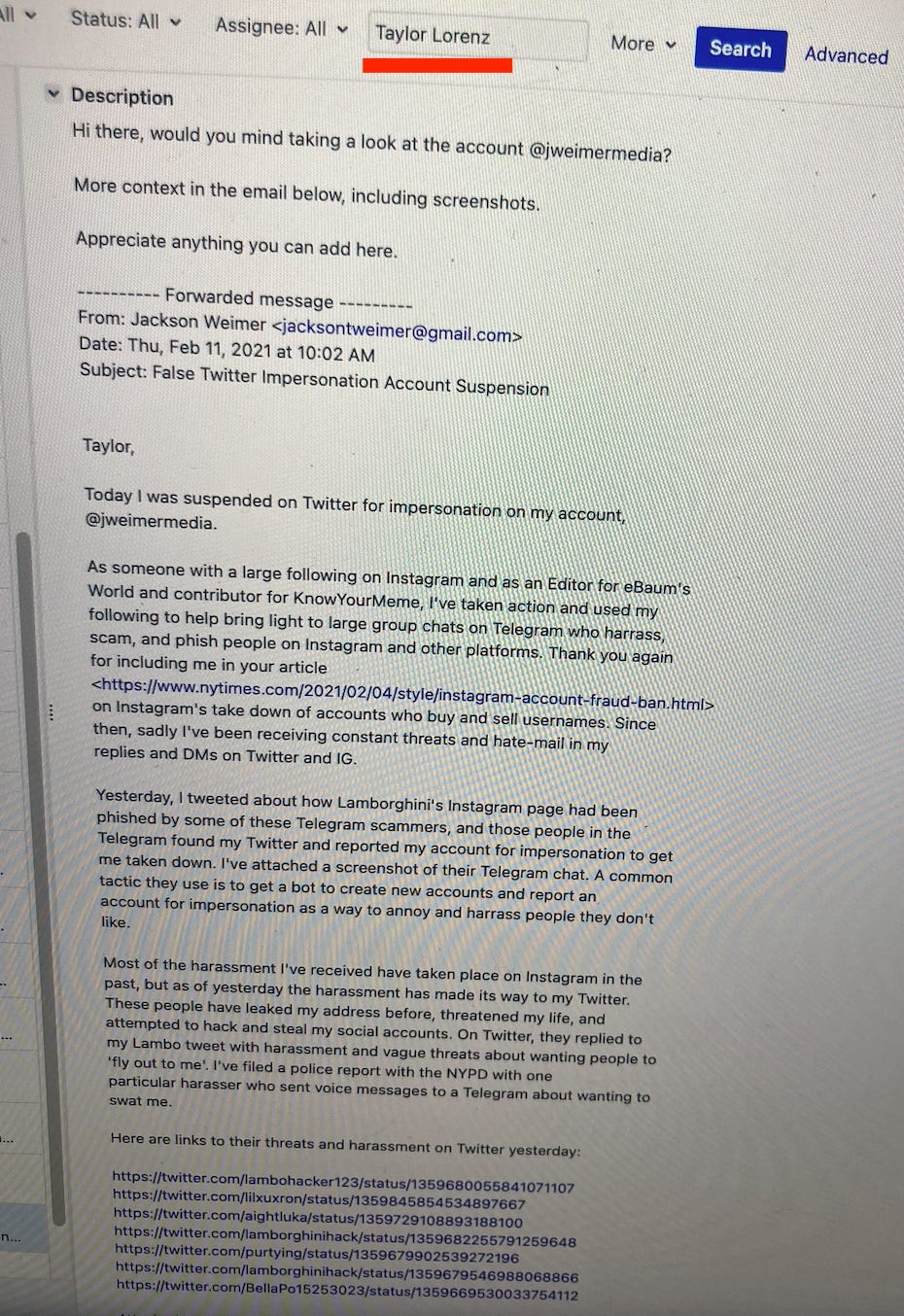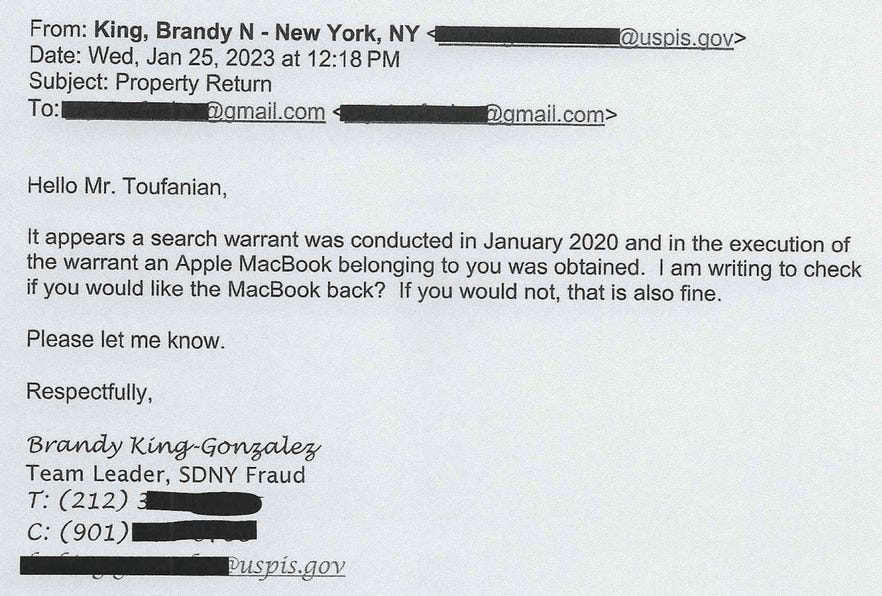TWITTER FILES: Twitter Provided Privileged Access to Banning Queen, Taylor Lorenz
Twitter engineer assisting me laughed, “Wow! She’s a heavy user.”
10 minute read
Shortly after Elon Musk purchased Twitter last October, he reinstated several accounts the company had banned, triggering anxiety among tech savvy reporters and eliciting a blaring headline from one of his greatest critics, the Washington Post’s Taylor Lorenz: “‘Opening the gates of hell’: Musk says he will revive banned accounts.”
Her detractors portray Lorenz as hyperbolic and anxious, a characterization she fulfilled by charging that Musk was setting off alarms across the internet, “Elon Musk plans to reinstate nearly all previously banned Twitter accounts — to the alarm of activists and online trust and safety experts.”
Reinstating banned Twitter accounts certainly alarmed Taylor Lorenz as well. According to newly disclosed Twitter files, Lorenz successfully banned an account only a few weeks prior to publishing her Washington Post essay. Other files show Lorenz behind other bans and that Twitter seemed to have a special relationship with her, sending out an alert after Tucker Carlson did a short segment on Fox News ridiculing her often-criticized reporting.
The month before Lorenz’s article alleging that Musk was “opening the gates of hell”, she successfully pushed to ban a Twitter account with a small following called @fearthefloof. This account dug into her past and detailed her life as a Manhattan rich girl, who attended a Swiss boarding school, and has a well-connected sister named Brook Lorenz—a publicist who has worked at CNN, the Washington Post and CBS News.
According to this now deactivated account, Lorenz is also able to scrub much of her past from web searches because her uncle owns the internet archive, which stores old webpages.
After Lorenz reported @fearthefloof, Twitter executives looked for possible violations of rules, but apparently found none, concluding the account was “generally healthy and mostly conversational or commentary in nature.” Nonetheless, the account was suspended for violating “Twitter media policy.”
The @fearthefloof tweets on Lorenz were then published on this website. I asked Lorenz by email to identify any false tweets by the account, but she did not respond.
Digging through Twitter’s files, I discovered other examples where Twitter granted Lorenz special privileges. After Tucker Carlson did a brief March 2021 Fox News segment deriding Lorenz’s penchant for labeling criticism of herself as “harassment,” one Twitter official alerted colleagues to monitor tweets about the Post columnist—“We need to be careful with her.”
This image inside Twitter of Lorenz as “victim” was likely aided by her near constant stream of complaints, asking Twitter to take down and suspend accounts. In another example, last fall, Lorenz reported and successfully suspended the account of Stanford professor Jay Bhattacharya after he tweeted an email one of her journalist friends sent him.
“It’s shocking that a journalist at the Washington Post would get involved in a minor twitter squabble,” said Bhattacharya, who described the email as harassing. “It’s even more shocking that Twitter responded.”
In one odd incident, Lorenz helped a long-term source try to get his Twitter account restored. In a February 2021 New York Times article, Lorenz quoted Instagram user Jackson Weimer on accounts that were being stolen by hackers. A week later, Lorenz contacted Twitter to see if they could help Weimer after Twitter suspended his account. “Hi there, would you mind taking a look,” Lorenz wrote. “Appreciate anything you can add here.”
“Wow! She’s a heavy user,” a Twitter engineer guffawed, as he guided me through Twitter’s reporting system.
Several targets of past Taylor Lorenz exposes told me she has massive influence inside social media companies and appears to coordinate attacks with left-wing political allies. “She’s constantly online and likes to pick on people,” said Arya Toufanian, the subject of a 2020 Lorenz article when Lorenz was at the New York Times. Toufanian sued Lorenz and lost, but he did get one of the sources Lorenz quoted in her article to sign an affidavit stating, “Ms. Lorenz never asked me for any documentary proof showing Mr. Toufanian defrauded or scammed anyone, or that Mr. Toufanian was operating any kind of pyramid scheme.”
Toufanian said that once he started complaining on social media about Lorenz’s reporting tactics, he suddenly lost his Instagram account that he used to generate business. While he cannot prove it, he believes that Lorenz rallied people to complain and get him banned. “Once you show any bit of aggressive response to her—not stroking her ego and submitting—she goes scorched earth.”
Instagram did not respond repeated requests asking why they suspended Toufanian account and if Taylor Lorenz reported him.
While Twitter Files do not show Lorenz coordinating with sources to attack critics, she and her sources seem to complain in lock step.
Months after Lorenz published a story attacking conservative humorist and gadfly Chaya Raichik, who runs the Twitter account Libs of Tik Tok, Twitter was emailed a letter asking the company to suspend the Libs of Tik Tok account. That letter was sent by Alejandra Caraballo, a transgender activist and clinical instructor at Harvard Law’s cyberlaw clinic. A month later, Lorenz quoted Caraballo in an essay stating that Apple and Google should boot Twitter from their app stores because Musk had ceased banning accounts.
“We ask that Twitter take action to suspend Libs of TikTok permanently,” wrote Caraballo in her email to Twitter’s general counsel last October. Attaching a letter to the email and asking for a meeting, Carballo wrote, “The letter is not public and is only addressed to Twitter executives.” Copied on the email is Imran Khan of the Center for Countering Digital Hate, a source cited in multiple Taylor Lorenz essays that call for social media accounts to be banned.
In a recent review of organizations that promote censorship, journalist Matt Taibbi described Khan’s group as “engaged in brazen smearing, attacking of dissenting views, deplatforming, [and] censoring.”
Twitter Lorenz
In her November Washington Post essay complaining about Musk, Lorenz quoted Caraballo, the transgender activist at Harvard Law’s cyberlaw clinic. As Caraballo told Lorenz:
Apple and Google need to seriously start exploring booting Twitter off the app store. What Musk is doing is existentially dangerous for various marginalized communities. It’s like opening the gates of hell in terms of the havoc it will cause. People who engaged in direct targeted harassment can come back and engage in doxing, targeted harassment, vicious bullying, calls for violence, celebration of violence. I can’t even begin to state how dangerous this will be.
A month before complaining to Taylor Lorenz that online stores should consider banning Twitter, Caraballo emailed Twitter a private letter on October 4, asking that they permanently ban @LibsofTikTok. Lorenz had reported on Libs of TikTok some months prior: “Meet the woman behind Libs of TikTok, secretly fueling the right’s outrage machine.”
In the email, Caraballo expressed “imminent public safety risks” caused by Libs of TikTok that were alleged to be inciting violence. “We would like to schedule a meeting within the coming days regarding this matter and would appreciate it if you could respond by Tuesday, October 11th.”
While the attached letter could not be opened, a separate email shows that Caraballo copied several organizations on the email including GLAAD, Lambda Legal, the Center for Countering Digital Hate, and multiple transgender activist groups.
In another email cited as “Privileged and confidential,” a Twitter attorney wrote, “[W]e responded thanking for the letter/email and saying that we would be back in touch re meeting.”
“All I do is just share what people put on Tik Tok, in their own words, which is scary to them,” Libs of TikTok's Raichik told me. “And this tears apart their narratives, because it’s first-hand evidence of how extreme they are. When they can’t debate their ideas, they then resort to censorship. And the first step was doxing me, and Taylor Lorenz showing up at my family’s house.”
Raichik added that by linking to her address in the story, Lorenz actually created sympathy for her and the Libs of TikTok Twitter account increased its followers three-fold. “Taylor’s plan backfired and turned me into a national public figure,” Raichik said. “I’m not saying I wanted that. But I’m just going to make the best of it.”
Raichik aded that she reported Caraballo multiple times to Twitter for harassment. I emailed Caraballo asking to see a copy of the letter sent to Twitter and if Raichik had succeeded in banning her. Caraballo did not respond to questions.
The day after Caraballo asked for Libs of TikTok to be banned, a Twitter employee wrote that Taylor Lorenz had reported an account called @fearthefloof. The email implies that Lorenz had successfully banned another account called @RobProvince. In this case, as in many others, the Twitter employee asked to see if violations could be found from multiple angles.
Could you please check this handle (@fearthefloof) for ban evasion? Taylor Lorenz, a journalist that has been doxxed many times, has reported his tweets to me. She believes that it is the same person that was behind @RobProvince account that has been banned.
If it is not ban evasion please check private media/harassment. Thank you.
Twitter’s investigations of that account seems to have found no violations of ban evasion, abusive safety policies, harassment toward Taylor Lorenz, platform manipulation, or the sharing of personal information.
“The account was generally healthy and mostly conversational or commentary in nature.”
Nonetheless, the account was suspended for violating Twitter’s media policy. After this suspension, the person running the account shut it down.
The month prior to getting @fearthefloof banned, Lorenz also reported Stanford professor Jay Bhattacharya, who tweeted an email he had received from reporter Walker Bragman. At the bottom of the email to Bhattacharya, Bragman included his phone number and email.
“I wasn’t trying to doxx the guy and make his phone number and email public,” said Bhattacharya. “I just wanted everyone to see what kind of journalist he was, and what he was accusing me of. It was so shocking and hostile. Bragman has written four or five stories about me making the same false accusations.”
Because Bhattacharya’s tweet of Bragman’s email included the phone number and email, Lorenz then reported Bhattacharya.
After Twitter suspended Bhattacharya’s account, people began making fun of Bragman for retweeting Bhattacharya tweet that contained Bragman’s own “private” information. Realizing his mistake, Bragman then deleted that tweet.
“In retrospect, the whole thing felt like a set up to get me banned,” said Bhattacharya. “What journalist doesn’t want people to know how to contact them?”
Doxing is for me, not for thee
Lorenz’s concerns about doxing ring somewhat hollow. In her Washington Post essay exposing Chaya Raichik as the person behind Libs of TikTok, Lorenz’s piece had a link to Raichik’s work address. In a defamation lawsuit filed in August 2021 and still working its way through the courts, Lorenz is also accused of doxing Ariadna Jacob in a New York Times article “Trying to Make It Big Online? Getting Signed Isn’t Everything.”
According to the lawsuit, Lorenz’s article linked to Jacob’s home address:
Shortly after Musk took over Twitter, Ariadna tweeted a complaint about Lorenz doxing her and making her personal address public. After seeing the tweet, Musk then temporarily banned Lorenz from Twitter. Jacob’s lawsuit is still moving forward and includes an affidavit signed by Adam Cohen, who was a minor at the time Lorenz interviewed him for the New York Times article.
In his affidavit, Cohen describes feeling “pressured” to give Lorenz “negative information” about Jacob and that Lorenz seemed “pissed” that he would not confirm what she apparently wanted to hear. “[Lorenz] became very short with me after I did not share negative information about [Jacob] and we ended the conversation.”
“We need to be careful with her.”
Lorenz seems to have had allies and protectors inside Twitter. In a March 2021 segment on Fox News, Tucker Carlson gave a mocking portrayal of Lorenz, comparing her to Meghan Markle, Michelle Obama, and Hillary Clinton, saying that Lorenz has “one of the best lives in the country.”
When someone posted a tweet of the segment, a Twitter employee alerted several employees to protect Lorenz:
Can we please Monitor the conversation around @taylorlorenz? She was specifically targeted by Tucker Carlson on his show tonight and I think she’s going to be in the center of an abuse campaign on the platform. She’s had tremendous trouble with abuse on here before and we need to be careful with her. Thank you.
Reporters often complain about online harassment—even I do!—yet no other journalist found in the Twitter Files seems have gotten special monitoring to stop abuse.
Several people I interviewed for this article said they have felt the wrath of Taylor Lorenz when she is on the warpath against them, after they complain about her reporting. But one Twitter File shows that Lorenz can also be a handy ally to compliant sources who are dealing with problems at social media companies. In 2019, Lorenz wrote an article for the Atlantic about porn on social media quoting then college student and Instagrammer Jackson Weimer. After Lorenz moved to the New York Times, Weimer was a source for Lorenz again, this time for an article about Instagram banning users with stolen account names.
Jackson Weimer, 22, the administrator of a meme account called @hugeplateofketchup8, said he has encountered hundreds of people who engage in this type of behavior online.
“Their main objective is to grow their pages, and selling these O.G. user names is a game for a lot of them,” he said. “Their objective is to do this to as many people as possible. Every meme page has encountered one of these people.”
A week after publishing that story, Lorenz contacted Twitter on behalf of Weimer, forwarding his complaint that he had been suspended.
“Hi there,” Lorenz emailed Twitter. “[W]ould you mind taking a look at the account @jweimermedia? More context in the email below, including screenshots. Appreciate anything you can add here.”
At the bottom of the email, you can see that Taylor Lorenz sent the email while she was at the New York Times.
Most recently, Weimer served as a Lorenz source for an essay last February in the Washington Post about gory videos of torture and killings that appear on Instagram.
Jackson Weimer, 24, a meme creator in New York, said he began to notice more graphic content on meme pages last year, when Instagram began to push Reels content heavily in his Instagram feed. At first, meme pages were posting sexually explicit videos, he said. Then the videos became darker.
“Originally, these pages would use sexual content to grow,” he said, “but they soon transitioned to use gore content to grow their accounts even quicker. These gore Reels have very high engagement, there’s a lot of people commenting.”
Toufanian told me that Lorenz spent months hounding him after publishing her November 2019 story that made him appear a criminal—later pinning it to the top of her Twitter account to notify all her followers that he could not be trusted.
After he filed a lawsuit against her, Toufanian said that Lorenz sent messages on social media about him, directing people to an attorney at the Department of Justice to gin up a criminal investigation.
The following month, the Department of Justice sent Toufanian a subpoena to appear before a grand jury looking into possible felony violations. The subpoeana reads almost like a condensed version of Taylor Lorenz’s article, and revisits many of the same allegations she made in her reporting.
Last January, the Department of Justice notified Toufanian by email that the investigation had ended and he could come pick up his now three-year old MacBook.
“It appears a search warrant was conducted in January 2020 and in the execution of the warrant an Apple MacBook belonging to you was obtained,” reads the email. “I am writing to check if you would like the MacBook back? If you would not, that is also fine.”
The Washington Post’s Cameron Barr did not respond to repeated requests to explain if Taylor Lorenz’s behavior conforms to Post ethics.
“I was never charged,” Toufanian told me. “I was investigated and she was urging people to attack me. In her mind she has eminent domain, and she’s can’t be wrong, because Swiss boarding school and rich family. I grew up rich, but I don’t spend all my time attacking people.”
Commenting further on Lorenz’s reporting he said, “You would think that the New York Times would at least update their story about me.”
Many thanks to Lindsay Jones for helping to collect, organize, and understand these Twitter Files. You can follow Lindsay on Twitter @TexasLindsay_ or subscribe to her Substack.



















That email from Caraballo was priceless. What a bunch of hysterical, fragile, nutcases.
Reading about all these Twitter’s employees performing activities that create zero value explains why the company underperformed, had low profitability. Getting paid to do. Nothing other than policing the adults kindergarten is not a job.